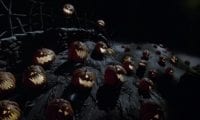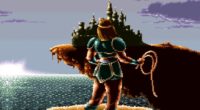We’ve finally reached the penultimate installment of The Terror: Infamy with this week’s episode, “Come and Get Me.” Was the show successful in setting up a grand climax? Let’s take a look at what went down, starting at the camp, as the gates are finally opened.
‘A Heavy Responsibility To The Nation’
The day has arrived at last; the Japanese citizens of the camp are finally free to leave, albeit into a sponsored work position that I assume will allow authorities to keep tabs on people.
This should be a great day, a time for celebration. But the American authorities cannot help but put a final dig in: “Today, by order of the Supreme Court, we repatriate you into American society. But don’t forget: you leave this camp bearing a heavy responsibility to the nation that has given you shelter through this trying time, and an obligation to the laws under which you especially must abide.”
Rather than the fog of suspicion be removed and their American citizenship be at last acknowledged, the Japanese campmates are reminded of their supposed “otherness.” They are freed but they are still not accepted.
Major Bowen’s absence is noted, but there is no consequence. Amy Yoshida is notably tense, a raw nerve exposed to scrutiny, but there is no threat. She leaves the camp, in a rush granted as the gates open, but there is no hint of the possibility she was to be apprehended. There is not even a sense of paranoia, no catching an officer’s eye ambiguously and for too long—just the anxiety to get away. This is the last we see of her. Except for one quick moment.
Terminal Island does not seem to have changed much since we last saw it. Quieter perhaps, there seems to be no people around at all. (It was a naval outpost, but it was also a fishing port with families living there. Have they been evacuated?) Still, home sweet home, right?
Wrong. As the remains of the Nakumara and Yoshida families turn onto their street, the street disappears from view. The vast expense of dead, barren land behind the gate bearing the sign “American Property” taunts with its traitorous emptiness. There is nowhere to belong, where the Japanese are allowed to belong. They have their freedom but there are no longer homes for them on American soil.
‘I Would Have Told You to Be a Man’
This, one would imagine, would be a large enough emotional and narrative scope for an entire episode to revolve on at least. But we are too late into the series, and there is not enough time or space.
Consequently, we are rushed through the fallout of enforced homelessness. There is a six-months-later tag, and we see Henry, patronised at work (gardening for a fat, rich American trying to sell him on rental accommodation so he can no doubt have a “legitimate” reason to take the majority of Henry’s wages back), and degraded at home.
Home? Not quite. A hostel on Skid Row can never really be called “home” convincingly. Unable to sleep on a bunk bed in a dormitory full of noisy, overpacked bodies, there is no privacy, there is no peace and no outlet to release one’s tension. There is no dignity in being reduced to such demeaning circumstances.
But just as things are getting bleakly interesting, Henry receives a phone call at the hostel. It has been heavily implied that Chester has not been in touch with his family since he left the camp, so how he knew they were in Skid Row, at that particular hostel, is a bit of a mystery (or plot hole—call it what you will). And in a rather handy voiceover sequence, Chester updates Henry on his marriage to Luz, their pregnancy and their being stalked by a certain spirit, just as Henry and Asako arrive in New Mexico to help. There is immediate tension between Chester and Henry. “I am sorry you married a fool,” Henry tells Luz. “My only comfort is that he does not share my blood.” Ouch.
Henry is justifiably angry at Chester’s ingratitude for the love and care he and Asako gave him. But Chester is either ignorant of this, or he has no empathy for it, wrapped up as he is in not-insubstantial problems involving a baby-stealing spirit.
“You always think you know everything,” Chester spits, forgetting he asked Henry to come and help in the first place. Henry is brutal but economical in his opinion: “I would have told you, if you love Luz, you wouldn’t bring any more misery onto her. I would have told you to be a man. But it’s too late for that now.” And while Henry might not know everything, he knows one thing that Chester thinks he is hiding: Chester is planning on running from town to town once the baby is born to shake Yuko off the track, but Henry knows that Chester knows it won’t work—she tracked him to New Mexico, after all. So what is Chester hiding?

A Bell Will Ring
One thing he is not hiding is a frankly stupid plan to screen visitors to see if they are possessed by Yuko. The person guarding the door sings three lines of a song in Spanish, and the person outside has to confirm they’re not possessed by singing the corresponding fourth line.
I don’t know what the thought process was, but come on—how would that even begin to work? We are not told enough about the song, so we don’t know if it is private to the family. Because, if it is a widely known song, what stops Yuko from using the pre-existing knowledge of the possessed to give the fourth line?
Which is exactly what happens when a priest, who has already gained access to Luz previously, enters the house again but this time is clearly possessed, uttering the fourth line of the song in a Pavlovian response to the previous three lines. A mad scramble ensues and Chester, Henry, Luz, Asako and Luz’s grandmother manage to escape in a car, flooring it before Yuko can catch up.
The motley crew ends up at a disused military site, a pass obtained from Luz’s cousin Hector who was previously stationed there. I don’t know what went down there previously but the spare, dirty environment and dark, grey-blue aesthetic feed into the aura, giving the scene a dingy, uneasy quality.
Chester and Henry set up little bells on string at just above foot level so they will hear if anyone comes (assuming the intruder doesn’t see the bell first and step over it). Luz gives birth, her grandmother and Asuko looking after her as Chester watches with the awe of a new father, and Henry stands outside, uncomfortable for more than one reason. The baby arrives, peacefully with no screams and crying. And right on cue, a bell rings.
‘Running Is Not a Plan’
On closer inspection, the bell ringing is the result of a curious rat. But it works into Chester’s plan, as it has given him a chance to painlessly slip away. Henry follows him and asks for the truth of the matter. Chester finally divulges his plan: “the thing Yuko really wants, her Taizo, he’s there. We give her that, she can leave my son alone.” He holds up a photograph of himself as a baby, the one from the orphanage, and the penny drops. Henry asks quite reasonably why Chester did not instigate his plan until now. Chester needed to see his son be born. “Because the magic only works if the person in the image is dead.”
Chester, for me, has been the character I have struggled the most with throughout the series. He is arrogant, he is narrow-minded in his way, and he does not seem to have too much empathy for people outside of himself and Luz at a push. But this was an interesting twist in that it showed there was something outside of himself that he cared deeply about (his child) and that he is willing to sacrifice himself to keep them safe. From an ego as big as Chester’s, this is no small act.
Henry is speechless as Chester leaves to go outside and commit suicide. Has he found some new respect in Chester, a sign that he is a man, willing to take some form of responsibility? Or does he still think he is a fool, selfishly making the wrong decision? A bit of both perhaps, but we get an indication of sorts when Chester is accosted by a drunken officer outside the site (who was there for god knows what reason) demanding to see Chester’s clearance. Henry gives the officer a good smack, rescuing Chester and showing that some form of respect is indeed in play.
But then they go back inside of the site. No reason is given. Has Chester changed his mind? Has Henry changed it for him? We never find out and so the great bit of character development we saw moments earlier, arguably the most important in Chester’s development, is reduced to a pointless plot device. A shame, as although it would have been a little bit cliché, Henry talking Chester out of the act would have made for a nice bonding moment and resolved the issues the two have between them.
Instead, back in the site, we get paranoia and suspicion. Luz is concerned that the baby is just staring at her, “as if it knows a secret.” Asuko begins to suspect that Yuko is already there, inside the baby. That certainly would have been a strange twist in itself but as Asuko get closer, Luz’s grandmother takes the baby and starts to walk away. Right idea, Asuko, just the wrong person.

Asuko throughout the show has been reduced to two narrow roles: worrying mother or mystic kook. Here she is given some meat to work with and she shines. Asuko demands that Yuko blame the correct person for the misery inflicted upon her: Asuko itself! It turns out it was Asuko who was destined for a life of misery with Mr. Furuya, and Yuko who was destined for Henry. However, when she found our Mr. Furuya was not honourable, and jealous of Yuko generally, Asuko lied to Yuko and sent her on her way to Mr. Furuya. She wasn’t aware Yuko was pregnant, so she adopted Taizo out of guilt.
It would have been easy for Asuko to plead for forgiveness here, but in a nice twist, Asuko reveals if she had her time again she wouldn’t change a thing! It’s a lovely bit of character layering, and it begs the question: why wasn’t Asuko allowed this opportunity before? Because it’s too late now—Yuko lashes out and Asuko falls down, bloody and possibly dying.
This is how Chester and Henry find her, and Luz’s grandmother is slumped in a corner, spent from the experience of possession. But where is Luz and the baby? Yuko is travelling again…
The scene has been set for the final confrontation. Whatever gaps there have been in the plot, the final battle is clear. Join me next week when we see who will come out victorious—Chester and Luz, or Yuko, as The Terror: Infamy comes to a close!


